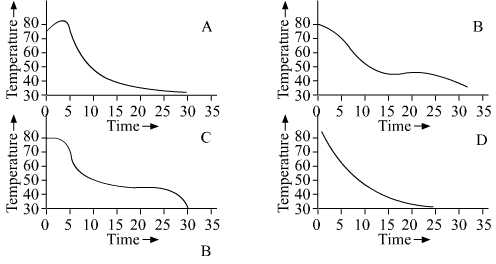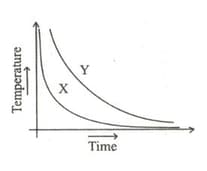Lakhmir Singh and Manjit Kaur Solutions for Chapter: Sound, Exercise 31: Exercise 3
Lakhmir Singh Physics Solutions for Exercise - Lakhmir Singh and Manjit Kaur Solutions for Chapter: Sound, Exercise 31: Exercise 3
Attempt the practice questions on Chapter 5: Sound, Exercise 31: Exercise 3 with hints and solutions to strengthen your understanding. Science for Ninth Class Part 1 Physics solutions are prepared by Experienced Embibe Experts.
Questions from Lakhmir Singh and Manjit Kaur Solutions for Chapter: Sound, Exercise 31: Exercise 3 with Hints & Solutions
For plotting temperature-time graph for a hot body, as it cools to room temperature, a student is to choose one each of the following pairs.
A: Calorimeter
(i) Blackened from outside (ii) Polished from outside
B: Base for keeping the calorimeter
(i) Insulated (ii) Metallic
In order to get the correct graph he should prefer to choose:
A student takes some water into a beaker and heats it over a flame for determining its boiling point. He keeps on taking its temperature readings. How would observe the temperature of water?
Two students X and Y have to do their experiment on plotting the temperature-time graph for a hot body as it cools to room temperature. They do their experiments in the same lab, using completely identical apparatus, take equal amounts of tap water heated up to the same temperature, start their observations simultaneously and note the temperature values at identically spaced intervals of time. Their temperature-time graphs, plotted on a given graph paper, with the same given choices of scales along the axis, are however, as shown: The following could be the reason for this difference:
(A) Use of an overhead fan by student X.
(B) Use of an overhead fan by student Y.
(C) Less frequent stirring of water by student X.
(D) Less frequent stirring of water by student Y.
The most likely reason is:
Four beakers are labelled as P,Q, R and S. A student puts salt solutions of different concentrations in the four beakers without spring balance gives a reading of in air. When this solid, while still suspended from the hook of spring balance, is fully immersed in beakers P,Q, R and S, the readings shown by the spring balance in the four beakers P,Q, R and S are and respectively. The most concentrated solution is contained in the beaker labelled as:
A student heats some amount of tap water in a calorimeter to a temperature of nearly above the room temperature. He then records the temperature of this water as it is cooling down at regular intervals of 2 minutes each. He tabulates his observations as follows:
| Time (in minutes) → | 0 | 2 | 4 | 6 | 8 | 10 |
| Temperature (in ºC) → | t1 | t2 | t3 | t4 | t5 | t6 |
You are given four salt solutions W, X, Y and Z of different concentrations. W is a salt solution, X is a salt solution, Y is a salt solution whereas Z is a salt solution. When a solid suspended from the hook of a spring balance is fully submerged in all these salt solutions, one by one, then the spring balance will show the minimum reading when the solid is immersed in:
When two solids are put in two pans of a beam balance, they exactly balance each other in air. When the two solids are completely immersed in water along with pans of balance, then they no longer balance each other. Which of the following is the incorrect statement about these balls?
The temperature-time graph obtained when hot water is allowed to cool resembles the graph given in one of the following figures. The correct figure is:


